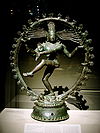This article needs additional citations for
verification. (November 2021) |
| Part of a series on |
| Shaivism |
|---|
 |
|
|
Anava ( Sanskrit: आणवा, romanized: āṇavā) (from "anu", meaning an atom or an exceedingly small entity) is a state - the consciousness of the ego, the sense of "I" and "mine". This represents a sense of individuality and a separation from a general existence of any "divine plan". One of the three bondages or pāśas: anava, karma and maya. In Shaivism, anava is the cause of the individual soul's mistaken sense of separate identity from Universal God Shiva, and the last bond broken before union ( yoga) or self-realization ( moksha). The three bondages are also explicitly discussed in the tantras of Shaktism. [1]
References
- ^ www.wisdomlib.org (2015-10-25). "Anava, Āṇava, Āṇavā, Aṇava, Ānava: 5 definitions". www.wisdomlib.org. Retrieved 2019-05-19.
This article needs additional or more specific
categories. (November 2021) |

